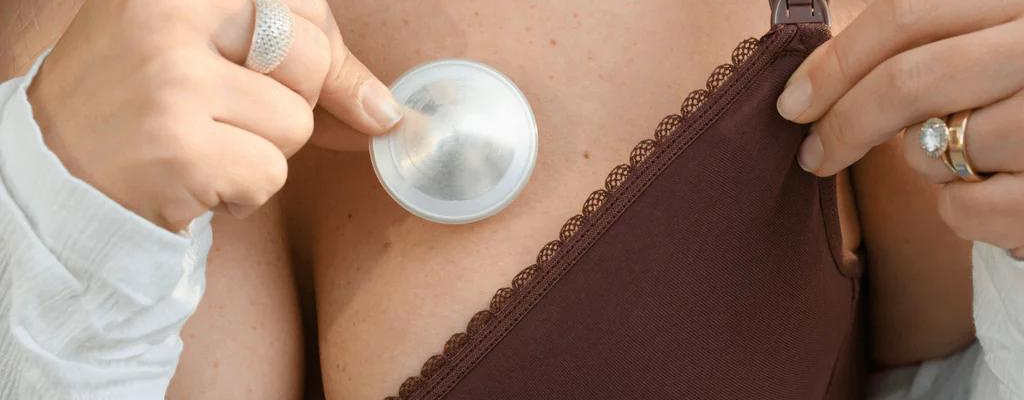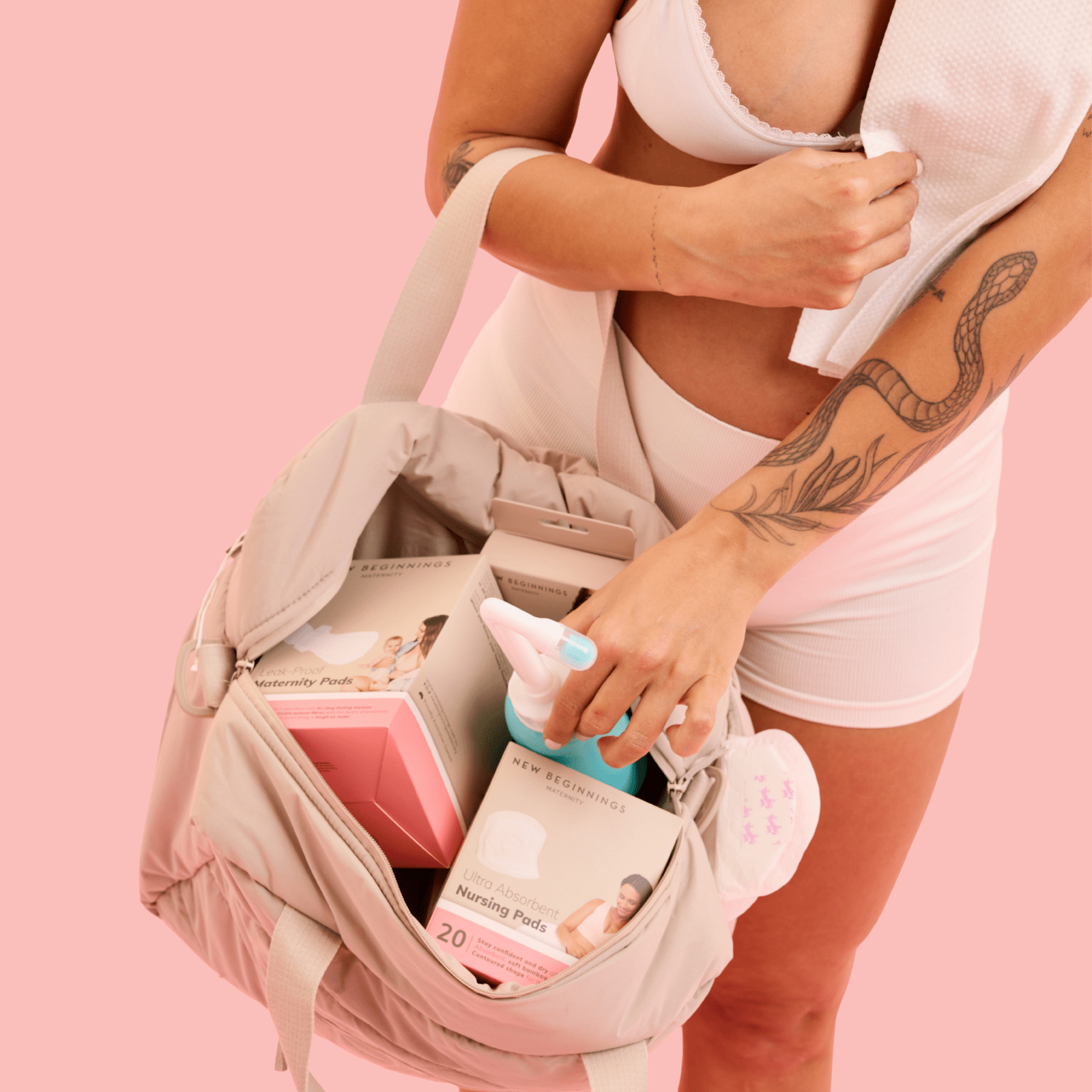Maternity Blog & News | New Beginnings
Breast Engorgement: Causes, Symptoms, and Relief
Breast engorgement is a common postpartum experience that can be painful and uncomfortable. Learn about the causes, symptoms, and effective relief for this uncomfortable time.
Learn moreTop Tips on Navigating C-Section Recovery: Your Journey to Healing Begins Here
You did it! You brought a beautiful little miracle into the world – and let's be honest, a C-section is no small feat. Now, it's time to focus on your own amazing recovery. This guide is your roadmap to rocking postpartum and feeling like your fantastic self again.
Learn moreWhen Will the Overnight Feeds Get Easier? (and Practical Tips to Help Manage)
Exhausted by late-night baby cries? You're not alone! This whirlwind phase is temporary, but those precious winks of sleep feel oh-so-distant. Don't fret, parents! We've got a toolbox of tips to transform those chaotic nights into calmer stretches (and maybe even some sleep!).
Learn moreNavigating Postpartum Depression
Exhausted but exhilarated, you finally hold your newborn in your arms. But what about the emotional waves that follow? This article aims to help new mums navigate postpartum depression.
Learn moreNavigating Postpartum & The Fourth Trimester
Conquer the chaos of postpartum with our must-have essentials list! From the unspoken disposable undies to comfy clothes and self-care tips, this postpartum guide will help new mummas thrive!
Learn moreTop Postpartum Self-Care Tips & Must-Have Products for New Mums
In this blog, we'll explore the significance of stocking up on your emotional self-love cup, as well as those essential postpartum products.
Learn more3 Must-Have Value Packs Every Mum and Bub Needs
From sterilisation to postpartum care and breastfeeding, discover our top three recommended new mum packs carefully tailored to support mums through the beautiful yet challenging journey of motherhood.
Learn moreNurturing maternal mental health
Both pregnancy and postpartum are times of profound change for mums with many moments of joy and anticipation. However, this period can also be marked by significant – and often unexpected – struggles, both physical and emotional. And at the core of it all, maternal mental health remains a relatively stigmatised issue. So, why aren’t we talking about it more?To help shed light on how important it is to speak about mental health during the perinatal period, we sat down with Jennifer Ericksen, Consultant Senior Clinical Psychologist at the Parent-Infant Research Institute (PIRI), Austin Health. Breaking down stigma and dispelling myths There’s no universal ‘first step’ in addressing maternal mental health issues. Everyone will have their own process, but a vital part of the process is simply acknowledging these struggles and recognising that seeking help is not a sign of weakness – but rather one of strength. While the cultural landscape is shifting to a more positive mindset around mental health, there’s still work to be done in breaking down barriers to care. Addressing mental health – from conception to post-partum and beyond "Talking about mental wellbeing at all stages of the perinatal journey with both partners is important because it sets the scene that mental health is just as important as physical health during this time," says Jennifer. "Untreated depression can affect not only the mother, but those close to her, including her partner and baby. While there is evidence to show that untreated maternal depression and anxiety can influence the baby’s development, it's essential to remember that not all babies are affected, and there are protective factors that can decrease this risk. Babies are remarkably resilient, and early intervention can make a significant difference."Learn more about adress mental health through R U OK? initiative. How MumSpace is a place for 24/7 support MumSpace is a sanctuary of support for expecting and new mothers all around the world. Its stepped-care approach to support is a model that gives parents access to a selection of tools that can help them understand and manage their mental health.“MumSpace provides a woman-centred approach to health care, giving new mums the opportunity to decide what they need and when,” Jennifer says. “It starts with parental resources that give information and strategies to manage the transition to parenthood, as well as key baby-management issues like sleeping and settling.”Beyond all the helpful information on MumSpace, there is also an app called MindMum, which is designed for those who need a little extra help in mood regulation throughout the transition to motherhood.“If a mum is experiencing more challenges or feeling overwhelmed, we have two great programs with strategies to manage perinatal depression and anxiety: MumMoodBooster (postnatal) and Mum2BMoodBooster (antenatal).”MumSpace is not just a platform – it's a lifeline that connects mothers with the support and resources they need to navigate the challenges of motherhood. MumMoodBooster is a beacon of hope for Aussie parents Among the valuable resources offered by MumSpace, MumMoodBooster stands out as a game-changer. Jennifer says the program is modelled on successful evidence-based face-to-face treatment for postnatal depression and anxiety.“It’s similar to the treatment that would be received if women were to see a psychologist for therapy,” she adds. “It’s very simple to use and is tailored to the issues mums are [dealing with].”The free program is available 24/7 – ideal for the unpredictable routines that can come with raising a newborn. It includes six online sessions that are entirely interactive, with mums able to work through exercises and then save them in their own ‘workbook’, which can then be downloaded.For those who are really struggling, Jennifer says the program will point you in the right direction for extra support. “Each session has a welcome video from a coach, and the sessions are supported by motivational SMS messages. There is also an option for women who score above a certain level on the Edinburgh Postnatal Depression Scale to opt for real-life coaching through PANDA.” DadSpace as a further resource for fathers Dads also need to be conscious of their own mental health during this time as “up to 1 in 10 new dads also struggle with depression which has been found to have an impact on developmental outcomes for children,” Jennifer says. This is why PIRI have introduced a valuable resource for dads called DadBooster, an online treatment program designed to provide support and guidance. To learn more about this program, please visit www.dadspace.com.au. Strategies for maintaining positive mental wellbeing While it’s never an exact science, here are Jennifer’s strategies that expectant and new mothers can try integrating into their daily lives:● Ask for help: Seek support before you feel overwhelmed. Having planned additional support can make the transition to parenthood less stressful.● Social connection: Join groups with other mothers. First-time parents’ groups and mother and child health (MCH) nurse groups can provide valuable social connections and support.● Communicate with your partner: Openly discuss your feelings and needs with your partner or support person. Sharing your thoughts can help you navigate this new chapter together.● Give yourself time: Adjusting to the demands of parenthood takes time, both for you and your baby. Be patient and allow yourself room for growth.● Embrace the imperfections: Remember that there is no such thing as a perfect mother. Being ‘good enough’ is all that is necessary for your baby’s wellbeing.● Seek balance above all else: Maintain balance in your life by setting aside time for yourself, your baby and your partner. Self-care isn’t selfish – it's essential. There’s a world of supportive tools within your reach Thanks to platforms like MumSpace and programs like MumMoodBooster, support is now readily available for mums seeking maternal mental health support during the perinatal period. It’s equally important to remember that this isn’t just an ongoing challenge for mums – it’s something that affects the entire family, and even more broadly, our wider community. Together, we can make sure every new beginning is a joyful one and every mental health struggle is met with the support that new parents need.
Learn moreTop 10 Tips for Postpartum Recovery
After giving birth, whether through a vaginal delivery or c-section, it's important to remember that the postpartum period is a time of recovery. This means that you, Mumma, need time to rest and recoup. Regardless of how smoothly your pregnancy went or how easy your delivery was, your body has undergone significant strain and needs time to heal so you can embrace being a new mum. We’ve put together our top 10 suggestions of things you can do to help cope during this time. 1: Rest! Easier said than done when you’ve just had a baby and it feels like there’s a never-ending list of things to do, but for the next few weeks you need to be able to ask for help and accept it when it’s offered. That means the washing, cleaning and anything physical can wait. 2: Eat well Eating well not only helps you heal faster, but if you’re breastfeeding, it also helps with your baby's development. So whether you order a weekly meal plan full of nutrient rich foods delivered to the door, or your parent, friend or partner is a whizz in the kitchen, make sure you’re filling your body with foods like fruits, vegetables, lean proteins, and whole grains. 3: Stay hydrated Sometimes it’s hard to keep track of how much water you’re drinking per day. Here are a few tips to keep you hydrated: Always keep a full water bottle in close reach Put a reminder every hour on your phone or watch to remind yourself to have a drink Jazz-up your water by adding a little flavour with slices of fresh fruit or a cold, flavoured tea bag Opt for herbal tea – this will help keep you warm and hydrated all in one go It’s extra important that Breastfeeding mums prioritise adequate hydration. Producing milk takes a toll on the body and staying hydrated will help facilitate the first postpartum bowel movement. 4: Dealing with discomfort Postpartum pain and discomfort are expected but manageable. Stock up on pain relief methods recommended by your healthcare provider and warm compresses. If you notice any discomfort as a result of breastfeeding, try our New Beginnings breast care range. Our Aqua Gel Breast Pads and Hot + Cold Breast Packs are a lifesaver. And as the saying goes, if pain persists, see your doctor! 5: Light exercise The best and fastest way to recover will be to slowly introduce moving your body a bit more each day. Start with some short walks and see how your body goes. There are also exercises you can do without even getting up, like strengthening your pelvic floor muscles, with kegels. Just remember, always consult your doctor before beginning any major exercise regimens, and make sure to check in at the 6 week postpartum milestone before getting started. 6: Listen to your body If you don’t feel up to something, don’t push yourself. This isn’t the time to be kicking goals or checking off to-do lists. 7: Healing time Postpartum recovery usually takes around six to eight weeks after delivery, but of course, there are some cases where it can take longer. This is where tip number seven is important, after all, slow and steady wins the race. 8: Vaginal bleeding During this time you’ll also experience things like postpartum bleeding & vaginal discharge. Both, while not pleasant, are your body's way of getting rid of the blood and tissue that was inside your uterus while being pregnant. Make sure you stock up on maxi pads – our New Beginnings Bamboo Maternity Pads are a great option! 9: Trouble in the toilet Experiencing constipation after childbirth is quite common. This is mostly due to pain-relieving meds or if you had an epidural during delivery. Rest assured there are ways to combat the problem: Drink plenty of water Eat high-fiber foods or get yourself some metamucil Try taking a bowel softener from your local chemist If your doctor advises you to take any iron supplements, make sure you select ones that don’t cause constipation 10: Reach out for support Postpartum recovery can bring up a rollercoaster of emotions. This is an important time to surround yourself with the emotional support of your partner, family, or friends. Joining local mother’s groups or seeking counseling can also provide a safe space to share your experiences. Above all, remember to be patient and kind to yourself. Embrace the ups and downs, celebrate small victories, and remind yourself that you're doing an incredible job! Finding yourself Googling everything from boobs and bums to bubs and bibs? Visit our New Beginnings website, where you’ll find a range of helpful articles, products and tips for navigating this new chapter of your life - mummahood.
Learn more













